- Home
- W. Somerset Maugham
The Summing Up
The Summing Up Read online
Table of Contents
Cover
About the Author
Also by W. Somerset Maugham
The Summing Up
Copyright
Chapter 1
Chapter 2
Chapter 3
Chapter 4
Chapter 5
Chapter 6
Chapter 7
Chapter 8
Chapter 9
Chapter 10
Chapter 11
Chapter 12
Chapter 13
Chapter 14
Chapter 15
Chapter 16
Chapter 17
Chapter 18
Chapter 19
Chapter 20
Chapter 21
Chapter 22
Chapter 23
Chapter 24
Chapter 25
Chapter 26
Chapter 27
Chapter 28
Chapter 29
Chapter 30
Chapter 31
Chapter 32
Chapter 33
Chapter 34
Chapter 35
Chapter 36
Chapter 37
Chapter 38
Chapter 39
Chapter 40
Chapter 41
Chapter 42
Chapter 43
Chapter 44
Chapter 45
Chapter 46
Chapter 47
Chapter 48
Chapter 49
Chapter 50
Chapter 51
Chapter 52
Chapter 53
Chapter 54
Chapter 55
Chapter 56
Chapter 57
Chapter 58
Chapter 59
Chapter 60
Chapter 61
Chapter 62
Chapter 63
Chapter 64
Chapter 65
Chapter 66
Chapter 67
Chapter 68
Chapter 69
Chapter 70
Chapter 71
Chapter 72
Chapter 73
Chapter 74
Chapter 75
Chapter 76
Chapter 77
Footnote
About the Author
* * *
William Somerset Maugham was born in 1874 and lived in Paris until he was ten. He was educated at King’s School, Canterbury, and at Heidelberg University. He spent some time at St. Thomas’s Hospital with the idea of practising medicine, but the success of his first novel, Liza of Lambeth, published in 1897, won him over to letters. Of Human Bondage, the first of his masterpieces, came out in 1915, and with the publication in 1919 of The Moon and Sixpence his reputation as a novelist was established. His position as a successful playwright was being consolidated at the same time. His first play, A Man of Honour, was followed by a series of successes just before and after World War I, and his career in the theatre did not end until 1933 with Sheppey.
His fame as a short story writer began with The Trembling of a Leaf, subtitled Little Stories of the South Sea Islands, in 1921, after which he published more than ten collections.. His other works include travel books such as On a Chinese Screen and Don Fernando, essays, criticism, and the autobiographical The Summing Up and A Writer’s Notebook.
In 1927 Somerset Maugham settled in the South of France and lived there until his death in 1965.
ALSO BY W. SOMERSET MAUGHAM
Of Human Bondage
The Moon and Sixpence
The Narrow Corner
The Razor’s Edge
Cakes and Ale
The Painted Veil
Collected Short Stories Vol. 1
Collected Short Stories Vol. 2
Collected Short Stories Vol. 3
Collected Short Stories Vol. 4
Ashenden
South Sea Tales
For Services Rendered
The Merry-Go-Round
Don Fernando
On a Chinese Screen
Catalina
Up at the Villa
Mrs Craddock
Liza of Lambeth
Ten Novels and their Authors
A Writer’s Notebook
The Casuarina Tree
Christmas Holiday
The Magician
Points of View
Selected Plays
Theatre
Then and Now
The Vagrant Mood
Far Eastern Tales
More Far Eastern Tales
This eBook is copyright material and must not be copied, reproduced, transferred, distributed, leased, licensed or publicly performed or used in any way except as specifically permitted in writing by the publishers, as allowed under the terms and conditions under which it was purchased or as strictly permitted by applicable copyright law. Any unauthorised distribution or use of this text may be a direct infringement of the author’s and publisher’s rights and those responsible may be liable in law accordingly.
Epub ISBN: 9781409090649
Version 1.0
www.randomhouse.co.uk
Published by Vintage 2001
4 6 8 10 9 7 5
Copyright © by the Royal Literary Fund
This book is sold subject to the condition that it shall not
by way of trade or otherwise, be lent, resold, hired out, or
otherwise circulated without the publisher’s prior consent in
any form of binding or cover other than that in which it is
published and without a similar condition including this
condition being imposed on the subsequent purchaser.
First published in Great Britain in 1938
by William Heinemann
Vintage
Random House, 20 Vauxhall Bridge Road,
London SW1V 2SA
Random House Australia (Pty) Limited
20 Alfred Street, Milsons Point, Sydney,
New South Wales 2061, Australia
Random House New Zealand Limited
18 Poland Road, Glenfield,
Auckland 10, New Zealand
Random House South Africa (Pty) Limited
Isle of Houghton, Corner of Boundary Road & Carse O’Gowrie,
Houghton 2198, South Africa
The Random House Group Limited Reg. No. 954009
www.randomhouse.co.uk
A CIP catalogue record for this book
is available from the British Library
ISBN 9780099286899
Papers used by Random House are natural, recyclable
products made from wood grown in sustainable forests.
The manufacturing processes conform to the
environmental regulations of the country of origin
Printed and bound in Great Britain by
CPI Antony Rowe, Chippenham, Wiltshire
1
THIS is not an autobiography nor is it a book of recollections. In one way and another I have used in my writings whatever has happened to me in the course of my life. Sometimes an experience I have had has served as a theme and I have invented a series of incidents to illustrate it; more often I have taken persons with whom I have been slightly or intimately acquainted and used them as the foundation for characters of my invention. Fact and fiction are so intermingled in my work that now, looking back on it, I can hardly distinguish one from the other. It would not interest me to record the facts, even if I could remember them, of which I have already made a better use. They would seem, moreover, very tame. I have had a varied, and often an interesting, life, but not an adventurous one. I have a poor memory. I can never remember a good story till I hear it again, and then I forget it before I have had a chance to tell it to somebody else.
I have never been able to remember even my own jokes, so that I have been forced to go on making new ones. This disability, I am aware, has made my company less agreeable than it might otherwise have been.
I have never kept a diary. I wish now that during the year that followed my first success as a dramatist I had done so, for I met then many persons of consequence, and it might have proved an interesting document. At that period the confidence of the people in the aristocracy and the landed gentry had been shattered by the muddle they had made of things in South Africa, but the aristocracy and the landed gentry had not realized this, and they preserved their old self-confidence. At certain political houses I frequented they still talked as though to run the British Empire were their private business. It gave me a peculiar sensation to hear it discussed, when a general election was in the air, whether Tom should have the Home Office and whether Dick would be satisfied with Ireland. I do not suppose that anyone to-day reads the novels of Mrs. Humphry Ward, but dull though they may be, my recollection is that some of them give a very good picture of what the life of the ruling class was then. Novelists were still much concerned with it, and even writers who had never known a lord thought it necessary to write largely about persons of rank. It would astonish anyone now who looked at the playbills of the day to see how many of the characters were titled. Managers thought that they attracted the public, and actors liked to portray them. But as the political importance of the aristocracy dwindled the public took less interest in it. Playgoers began to be ready to observe the actions of people of their own class, the well-to-do merchants and professional men who were then conducting the affairs of the country; and the rule, though never formulated, prevailed that the writer should not introduce persons of title unless they were essential to his theme. It was still impossible to interest the public in the lower classes. Novels and plays that dealt with them were very generally considered sordid. It will be curious to see if now that these classes have acquired political power the public at large will take the same interest in their lives that for so long it took in the lives of the titled, and for a while in those of the opulent bourgeoisie.
During this period I met persons who by their rank, fame or position might very well have thought themselves destined to become historical figures. I did not find them as brilliant as my fancy had painted them. The English are a political nation, and I was often asked to houses where politics were the ruling interest. I could not discover in the eminent statesmen I met there any marked capacity. I concluded, perhaps rashly, that no great degree of intelligence was needed to rule a nation. Since then I have known in various countries a good many politicians who have attained high office. I have continued to be puzzled by what seemed to me the mediocrity of their minds. I have found them ill-informed upon the ordinary affairs of life, and I have not often discovered in them either subtlety of intellect or liveliness of imagination. At one time I was inclined to think that they owed their illustrious position only to their gift of speech, for it must be next door to impossible to rise to power in a democratic community unless you can catch the ears of the public; and the gift of speech, as we know, is not often accompanied by the power of thought. But since I have seen statesmen who did not seem to me very clever conduct public affairs with reasonable success I cannot but think I was wrong: it must be that to govern a nation you need a specific talent and that this may very well exist without general ability. In the same way I have known men of affairs who have made great fortunes and brought vast enterprises to prosperity, but in everything unconcerned with their business appear to be devoid even of common sense.
Nor was the conversation that I heard then as clever as I had expected. It seldom gave you much to think about. It was easy, though not always, gay, amiable and superficial. Serious topics were not dealt with, for there was a feeling that to discuss them in general company was embarrassing, and the fear of ‘shop’ seemed to prevent people from speaking of the subjects in which they were most interested. So far as I could judge conversation consisted in little more than a decorous badinage; but it was not often that you heard a witticism worth repeating. One might have thought that the only use of culture was to enable one to talk nonsense with distinction. On the whole I think the most interesting and consistently amusing talker I ever knew was Edmund Gosse. He had read a great deal, though not very carefully, it appears, and his conversation was extremely intelligent. He had a prodigious memory, a keen sense of humour, and malice. He had known Swinburne intimately and could talk about him in an entrancing fashion, but he could also talk of Shelley, whom after all he could not possibly have known, as if he had been a bosom-friend. For many years he had been acquainted with eminent persons. I think he was a vain man, and he had observed their absurdities with satisfaction. I am sure he made them much more amusing than they really were.
2
I HAVE always wondered at the passion many people have to meet the celebrated. The prestige you acquire by being able to tell your friends that you know famous men proves only that you are yourself of small account. The celebrated develop a technique to deal with the persons they come across. They show the world a mask, often an impressive one, but take care to conceal their real selves. They play the part that is expected from them, and with practice learn to play it very well, but you are stupid if you think that this public performance of theirs corresponds with the man within.
I have been attached, deeply attached, to a few people; but I have been interested in men in general not for their own sakes, but for the sake of my work. I have not, as Kant enjoined, regarded each man as an end in himself, but as material that might be useful to me as a writer. I have been more concerned with the obscure than with the famous. They are more often themselves. They have had no need to create a figure to protect themselves from the world or to impress it. Their idiosyncrasies have had more chance to develop in the limited circle of their activity, and since they have never been in the public eye it has never occurred to them that they have anything to conceal. They display their oddities because it has never struck them that they are odd. And after all it is with the common run of men that we writers have to deal; kings, dictators, commercial magnates are from our point of view very unsatisfactory. To write about them is a venture that has often tempted writers, but the failure that has attended their efforts shows that such beings are too exceptional to form a proper ground for a work of art. They cannot be made real. The ordinary is the writer’s richer field. Its unexpectedness, its singularity, its infinite variety afford unending material. The great man is too often all of a piece; it is the little man that is a bundle of contradictory elements. He is inexhaustible. You never come to the end of the surprises he has in store for you. For my part I would much sooner spend a month on a desert island with a veterinary surgeon than with a prime minister.
3
IN this book I am going to try to sort our my thoughts on the subjects that have chiefly interested me during the course of my life. But such conclusions as I have come to have drifted about my mind like the wreckage of a foundered ship on a restless sea. It has seemed to me that if I set them down in some sort of order I should see for myself more distinctly what they really were and so might get some kind of coherence into them. I have long thought I should like to make such an attempt and more than once, when starting on a journey that was to last for several months, have determined to set about it. The opportunity seemed ideal. But I have always found that I was assailed by so many impressions, I saw so many strange things and met so many people who excited my fancy, that I had no time to reflect. The experience of the moment was so vivid that I could not attune my mind to introspection.
I have been held back also by the irksomeness of setting down my thoughts in my own person. For though I have written a good deal from this standpoint I have written as a novelist and so in a manner have been able to regard myself as a character in the story. Long habit has made it more comfortable for me to speak through the creatures of my invention. I c
an decide what they would think more readily than I can decide what I think myself. The one has always been a pleasure to me; the other has been a labour that I have willingly put off. But now I can afford to put it off no longer. In youth the years stretch before one so long that it is hard to realize that they will ever pass, and even in middle age, with the ordinary expectation of life in these days, it is easy to find excuses for delaying what one would like to do but does not want to; but at last a time comes when death must be considered. Here and there one’s contemporaries drop off. We know that all men are mortal (Socrates was a man; therefore—and so forth), but it remains for us little more than a logical premiss till we are forced to recognize that in the ordinary course of things our end can no longer be remote. An occasional glance at the obituary column of The Times has suggested to me that the sixties are very unhealthy; I have long thought that it would exasperate me to die before I had written this book, and so it seemed to me that I had better set about it at once. When I have finished it I can face the future with serenity, for I shall have rounded off my life’s work. I can no longer persuade myself that I am not ready to write it, since if I have not by now made up my mind about the things that seem of importance to me there is small likelihood that I shall ever do so. I am glad at last to collect all these thoughts that for so long have floated at haphazard on the various levels of my consciousness. When they are written down I shall have finished with them and my mind will be free to occupy itself with other things. For I hope that this will not be the last book I shall write. One does not die immediately one has made one’s will; one makes one’s will as a precaution. To have settled one’s affairs is a very good preparation to leading the rest of one’s life without concern for the future. When I have finished this book I shall know where I stand. I can afford then to do what I choose with the years that remain to me.
4
IT is inevitable that in it I should say many things that I have said before; that is why I have called it The Summing Up. When a judge sums up a case he recapitulates the facts that have been put before the jury and comments on the speeches of counsel. He does not offer new evidence. And since I have put the whole of my life into my books much of what I have to say will naturally have found a place in them. There are few subjects within the compass of my interests that I have not lightly or seriously touched upon. All I can attempt to do now is to give a coherent picture of my feelings and opinions; and here and there, maybe, to state with greater elaboration some idea which the limitations I have thought fit to accept in fiction and in the drama have only allowed me to hint at.

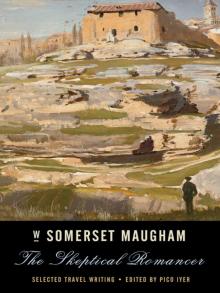 The Skeptical Romancer: Selected Travel Writing
The Skeptical Romancer: Selected Travel Writing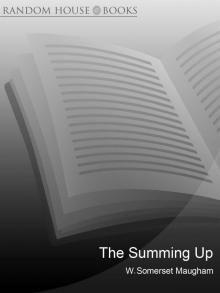 The Summing Up
The Summing Up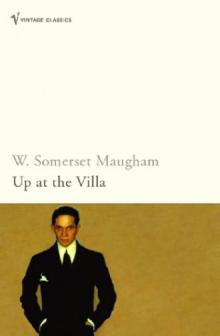 Up at the Villa
Up at the Villa The Razor's Edge
The Razor's Edge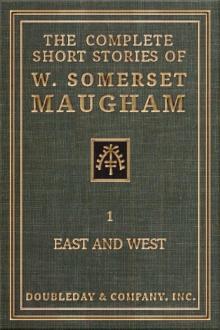 The Complete Short Stories of W. Somerset Maugham: East and West (Vol. 1 of 2))
The Complete Short Stories of W. Somerset Maugham: East and West (Vol. 1 of 2))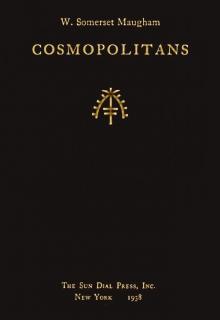 Cosmopolitans
Cosmopolitans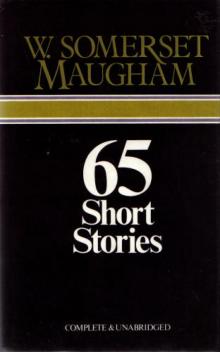 65 Short Stories
65 Short Stories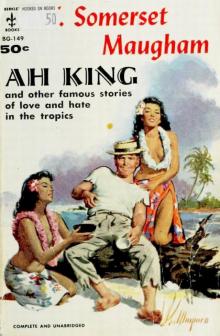 Ah King (Works of W. Somerset Maugham)
Ah King (Works of W. Somerset Maugham)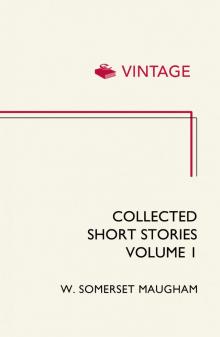 Collected Short Stories: Volume 1
Collected Short Stories: Volume 1 Collected Short Stories Volume 2
Collected Short Stories Volume 2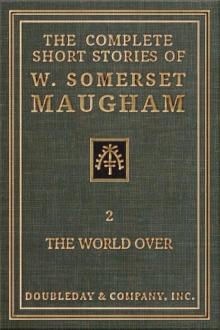 The Complete Short Stories of W. Somerset Maugham - II - The World Over
The Complete Short Stories of W. Somerset Maugham - II - The World Over Collected Short Stories Volume 4
Collected Short Stories Volume 4 Theatre
Theatre Short Stories
Short Stories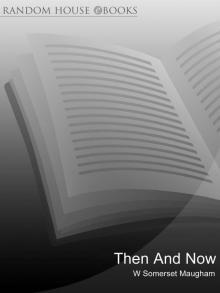 Then and Now
Then and Now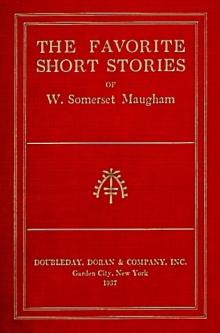 The Favorite Short Stories of W. Somerset Maugham
The Favorite Short Stories of W. Somerset Maugham Of Human Bondage
Of Human Bondage The Magician
The Magician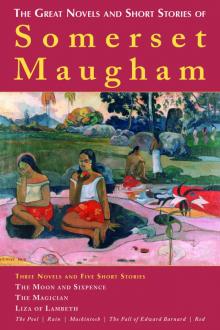 The Great Exotic Novels and Short Stories of Somerset Maugham
The Great Exotic Novels and Short Stories of Somerset Maugham A Writer's Notebook
A Writer's Notebook Christmas Holiday
Christmas Holiday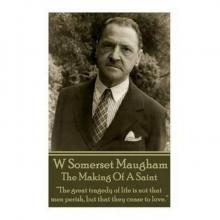 The Making of a Saint
The Making of a Saint Merry Go Round
Merry Go Round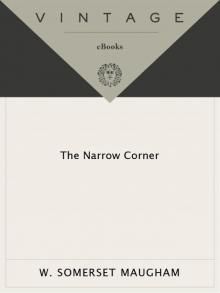 The Narrow Corner
The Narrow Corner Collected Short Stories Volume 3
Collected Short Stories Volume 3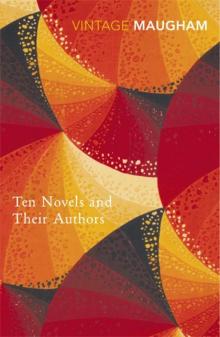 Ten Novels and Their Authors
Ten Novels and Their Authors Ashenden
Ashenden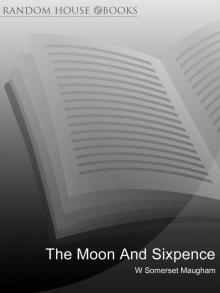 The Moon and Sixpence
The Moon and Sixpence Cakes and Ale
Cakes and Ale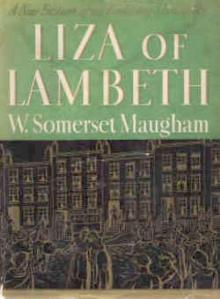 Liza of Lambeth
Liza of Lambeth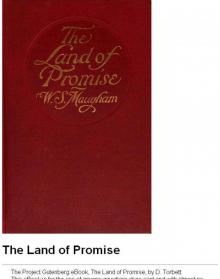 The Land of Promise: A Comedy in Four Acts (1922)
The Land of Promise: A Comedy in Four Acts (1922) A Writer's Notebook (Vintage International)
A Writer's Notebook (Vintage International)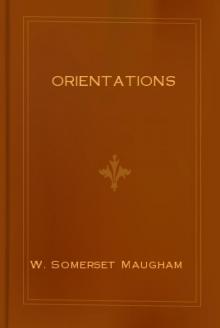 Orientations
Orientations Selected Masterpieces
Selected Masterpieces Mrs Craddock
Mrs Craddock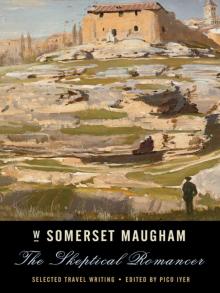 The Skeptical Romancer
The Skeptical Romancer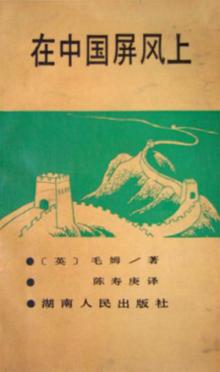 On a Chinese Screen
On a Chinese Screen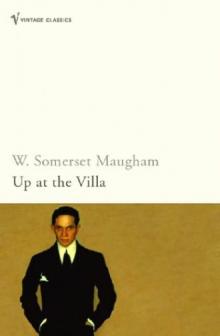 (1941) Up at the Villa
(1941) Up at the Villa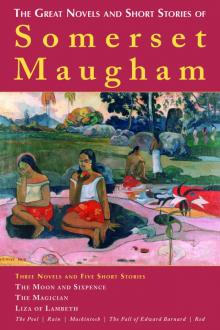 The Great Novels and Short Stories of Somerset Maugham
The Great Novels and Short Stories of Somerset Maugham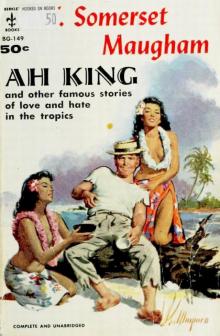 Ah King
Ah King The Explorer
The Explorer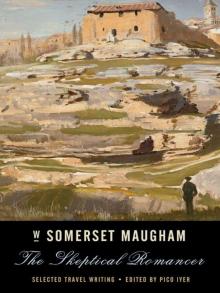 The Skeptical Romancer: Selected Travel Writing (Vintage Departures)
The Skeptical Romancer: Selected Travel Writing (Vintage Departures)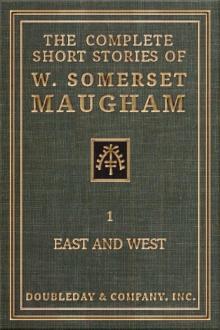 The Complete Short Stories of W. Somerset Maugham - I - East and West
The Complete Short Stories of W. Somerset Maugham - I - East and West